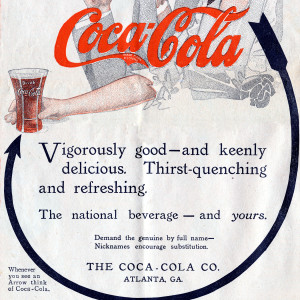Stop Trying to Sell Me Things
I averted my eyes from a billboard while driving on the highway today. I won’t pretend like I did it for the sake of keeping my eyes on the road; I did it out of principle. I’m still not sure what it was advertising, though if the previous twenty I had already seen were any indication, it was likely a brief but nevertheless compelling argument for why my current insurance provider was inadequate.
Hm. I never realized.
I DID realize that I was low on gas though, so I stopped to refuel at a nearby station. As my car gulped away my paycheck, I was treated to an advertisement about the financial benefits of a fuel-saver membership card, delivered by way of a television screen embedded in the gas pump. First my insurance craps out on me, and now I’m losing potential money every time I fuel up? The day was getting worse and worse.
When I got home, I made the mistake of turning on my laptop. In past years, I had used Adblock to keep my screen clear of unwanted agendas being foisted on me, but in the spirit of e-commerce, I decided to put an end to that practice.
And what did I get for my trouble?
Huge banners that cover half the page. Dancing cartoons advertising toothpaste. Pop-up windows screaming for attention. The Internet wasn’t safe. Nowhere was safe.
The age of advertisement is here.
*Ad Space for Purchase*
I don’t necessarily take issue with advertising on the whole; it’s pretty essential to the whole ‘sales/economy’ thing. What gets me is the virtual inability to escape advertising, no matter where you go. Finding new ways to fit ads into our daily lives has become big business for marketers. Wherever there are eyes to be found, there is potential for monetization. Even now I imagine that a mountain man is standing near his log cabin out in the wilderness, staring up at the airplane with the trailing banner describing the log cabin insurance that can be found one acre to the left.
Commercials have always had their place in the media, but even video subscription services are including commercials these days, commercials they force you to watch if you want to use their service. (Why the heck am I paying for a premium service if you’re going to make me sit through ads, anyway?)
Movie theatres gave up the advertising ghost long ago. Remember when there weren’t commercials before your movie? But see, you have a big group of folks sitting in front a huge screen with nothing to do but wait until their movie starts. You can almost hear the cash registers ringing in the ears of advertisers.
Even our gas pumps have televisions in them now, putting those few precious seconds of forced stillness to good use. I imagine future generations will laugh when we tell them that we used to fill up our cars in utter silence without a salesman barking in our ears.
But this unfortunate trend seems to be the way the world is moving—advertising is becoming less about the quality of the ad and more about how can we cram as many ads into their lives as possible?
*This Headline Sponsored by Burger King ®*
Clearly, businesses have no problem with this trend: consider the 2015 Super Bowl, which had around  114.4 million viewers. (To put that into perspective, that’s over 1/3rd of the entire population of the United States.) The price of an ad during this sporting event? An estimated $4.4 to 4.5 million per 30 seconds of air time. Granted, the Super Bowl comes ‘round but once a year and is a pretty big ticket event, but that’s a hefty sum to drop for an amount of time that could be missed by taking a trip to the bathroom.
114.4 million viewers. (To put that into perspective, that’s over 1/3rd of the entire population of the United States.) The price of an ad during this sporting event? An estimated $4.4 to 4.5 million per 30 seconds of air time. Granted, the Super Bowl comes ‘round but once a year and is a pretty big ticket event, but that’s a hefty sum to drop for an amount of time that could be missed by taking a trip to the bathroom.
Nonetheless, businesses were willing to pay it—netting NBC an estimated $360 million in ad sales alone.
In the end, advertising boils down to one concept: this product will make your life better. It’s the crux of every type of marketing strategy and advertising campaign. It’s common, and it works.
I’m not saying it’s not important; it is!
All I’m asking for is a break.
Let’s just turn off the sales machine for a minute and bask in the glow of an all-too rare commodity in today’s fast-paced, sales-driven world:
Silence.
Greg Hill is a web content writer from the Midwest with a penchant for self-actualization and racquetball.

